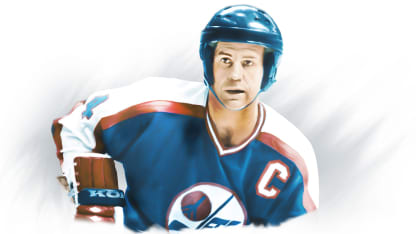Lars-Erik Sjoberg had just finished a very successful 1973-74 season in Sweden.
He was part of a bronze medal winning Swedish national team at the World Championship and was named not only the best defenceman in the tournament, but Sweden's best player as well.
But he had a decision to make, as did fellow Swedes Anders Hedberg and Ulf Nilsson.
Borje Salming, just one year earlier, had left Sweden to join the National Hockey League. Should Sjoberg, Hedberg, and Nilsson want to do the same, they would have to split up.
Lars-Erik Sjoberg's leadership fondly remembered by former teammates
"Educated, intelligent, smart, a diplomat, and a very natural leader for our group."

"(Sjoberg) belonged to Minnesota I think. If I wanted to go to the NHL (it would be) in Buffalo, Anders to Toronto," Nilsson recalled. "We said, 'I think we can have a much bigger impact if we go together and we can maybe influence the team on how we want to play the game.' (Sjoberg) had a really big part of that."
So the trio set their sights on Winnipeg and the World Hockey Association, suiting up for the Jets to start the 1974-75 season.
His first season in Winnipeg, the defenceman affectionately known as "Shoe" scored seven times and accumulated 60 points. His teammates Nilsson and Hedberg would combine for 220 points as forwards.
That same season, Finnish forward Veli-Pekka Ketola came to Winnipeg. He recalled the influence Sjoberg had in the dressing room, even prior to being named captain to start the 1975-76 season.
"We Finns, when we come to Winnipeg and we hear we have to play with seven Swedes, we say 'oh what are we going to do?'" Ketola laughed. "But when we arrived in Winnipeg and started practicing and playing, Shoe was great. He was helpful and always laughing, funny, and he was a team guy. He never made a big number of himself. He was just one player on the team."
Ketola knows a thing or two about leadership. He wore the captain's 'C' for the Finnish national team four times. He could see all the off-ice traits Sjoberg had that a leader required - and on the ice, his talent was just as evident.
"I would say he was one of the best defencemen I've seen on the ice when we talk about his ability to play as a team," said Ketola. "He wasn't so strong, he wasn't so big, but he always did everything right.
"In practice we had one-on-one drills and those things. If Shoe was waiting for me, I tried three years to beat him one-on-one, and I didn't succeed. He was so good skating."
Bill Lesuk came to the Jets from the Washington Capitals to start the 1975-76 season and had a front row seat to the work ethic that made Sjoberg so tough to beat.
"You would see him in practices working and doing the extra work. He said, 'I have to keep my speed up.' That was excellent," said Lesuk, who played under Sjoberg's captaincy until the end of the 1979-80 campaign.
Lesuk described Sjoberg as a captain who was never satisfied and always felt the team could get better. But he was never one to pick out individuals.
"He was really looked upon as a leader. You're born with some of these attributes," Lesuk said. "We could always do better. That's the way he would come across. It was always a 'we' thing."
All that hard work paid off.
Sjoberg and the Jets finished that 1975-76 WHA regular season with a 52-27-2 record. They rode that momentum into the playoffs and won their first Avco Cup with a four-game sweep of the Houston Aeros.
They'd get all the way back to the final the next season but would fall in seven games to Quebec.
Sjoberg and the Jets returned as a determined team in the 1977-78 WHA season. Sjoberg hit 50 points for the second time in his WHA career and helped the team to a second Avco Cup, punctuated by a sweep of the New England Whalers in the final.
Sjoberg, 34-years-old at the time, was named the WHA's Best Defenceman in that season.
"They were the best years of my life and my career in hockey," Lesuk said, adding nobody had a bigger smile on their face lifting the Avco Cup over their head than Sjoberg.
"To think of Shoe, he was the guy you'd be happiest to see because of the way he showed his appreciation of all that was around him. The biggest smile you could get. Just thinking about seeing one of the smallest players, but one of the biggest hearts out there."
Over the course of six seasons in Winnipeg, Sjoberg played 387 regular season games, scored 32 goals and finished with 226 points.
He won three Avco Cups, and in the mind of Hedberg - who received too many passes to count from Sjoberg - he was exactly the captain the Jets needed.
"He was a very natural captain for a group of 20 guys," said Hedberg. "Educated, smart, intelligent, a diplomat, and a very natural leader for our group."


















